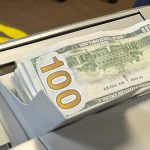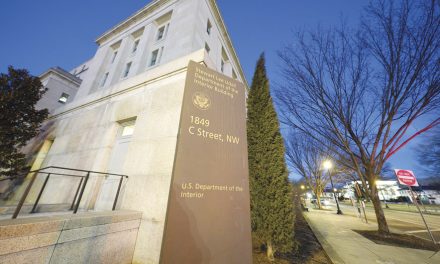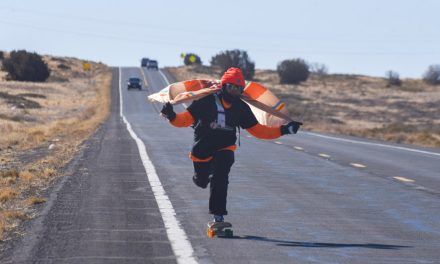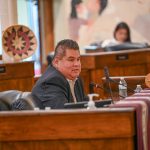
Nez: Division directors working hard to spend CARES funds
WINDOW ROCK
Navajo government division directors are working hard to spend CARES Act funds and making progress, President Jonathan Nez assured the Navajo Nation Council during his state of nation address Monday.
Nez said much is being done to spend the $714 million diligently and in a timely manner.
He recognized the work by the Council, which produced five resolutions to spend the money.
“I know there are concerns about the slowness of procuring those dollars,” he said, “but I assure you that our division directors, who are on the call, (deserve) recognition on the hard work they have done and are doing to spend those dollars on various infrastructure initiatives.”
Regarding the $49 million for hardship assistance and $90 million for chapters, Nez said he “appreciated the vision” of Council to put stipulations that unspent dollars be diverted to hardship assistance. He also said he wants to bring awareness to rural areas and to the most vulnerable population to know about this available funding.
“We are doing our very best to make sure those infrastructure projects get complete,” said Nez. “We did allocate $20-plus million to the Office of the Controller so that should alleviate some barriers to get money through the system.”
With the Navajo Nation well into its seventh month coping with the coronavirus pandemic, most of the address was related to COVID-19 such as funding for projects, economic development and the vaccine trial.
Delegates question Nez
Delegates questioned Vice President Myron Lizer’s travel to political rallies and questioned the administration’s transparency in general.
“We would think that you would be consulting the Navajo Nation of the decisions you have been making,” said Delegate Eugenia Charles Newton after reading aloud a veto message Nez had written.
“My question to you is did you consult Council,” she said, “the governing body of the Navajo Nation with this decision to allow our Navajo people to be used for these COVID-19 trials?
The COVID-19 vaccine trials are controversial with both the Navajo people and Navajo government weighing in on the issue. Nez said to his understanding there were agency resolutions to allow the trials.
As a public service, the Navajo Times is making all coverage of the coronavirus pandemic fully available on its website. Please support the Times by subscribing.
How to protect yourself and others.
Why masks work. Which masks are best.
Resources for coronavirus assistance
He also said the decision wasn’t his but rather was the Navajo Human Research Review Board in coordination with John Hopkins Center for American Indian Health.
“When I got a full briefing of this it was after the oversight committee – Health, Education and Human Services Committee – received a report from John Hopkins,” answered Nez.
“Our stance was if our Navajo citizens are volunteering then leadership shouldn’t stand in the way,” he said. “The HEHSC committee did get a report prior to an update to me.”
Newton also brought up another controversial topic: Lizer’s travels to meet President Donald Trump and to attend his rallies.
The most recent event was Donald Trump Jr’s visit to Williams, Arizona.
She noted that a colleague had attended a Trump event but failed to name him. It was later revealed that Delegate Rickie Nez attended the Williams event also.
“Attending events without masks and with more than six individuals,” said Newton. “Here have been events that our vice president has attended to re-elect Donald Trump. The Vice President works along with you, President Nez. Do you condone the vice president to attend events without a mask?”
In defense, LIzer, who also stated he’s never had a flu shot, said he has every right to meet with Trump and the “federal family,” and that he in fact wears two masks and is following 95 percent of the Navajo Nation health mandates when travelling off the Navajo Nation.
Lizer said “our newspaper” sensationalizes his meetings with Trump, referring to a Navajo Times article that wrongfully reported he had travelled to Tulsa, Oklahoma, for a rally. A photo of Lizer that the reported based this statement on wasn’t taken in Tulsa but in Phoenix at another event.
“I do travel within the open hours of our curfew,” said Lizer. “I feel I am justified. Social media should not be where anybody gets their news.
“I feel I am justified as the vice president of the Navajo Nation to meet with the most powerful leader in the free world,” he said. “I can’t help it if this sitting president isn’t readily accepted in Indian Country, a place where we haven’t seen much progress in the last 40 years.”
Leading the Navajo Nation’s economic recovery work group, Lizer said the Nation’s inability to make projects happen has been discussed, and separating business decisions from central government is a solution to this issue.
He told delegates the group has a strong economic plan to help the Nation emerge from the pandemic better than it was before the virus struck.
“A growth fund with strong leadership and devoted to vetting any all economic development opportunity is needed,” said Lizer. “We’ve espoused a vetting vehicle here at our economic recovery work group. I will have a meeting with every one of you 24 delegates on what economic development looks like here.”
Resource and Development Committee member Mark Freeland asked about the economic future of the Navajo Nation. He said when Navajo Generating Station and Kayenta Mine closed that should have been the moment to prepare for the economic future of the Nation.
“We can’t continuously depend on the UUFB (Undesignated Unreserved Fund Balance), or any sort of interest money that we get,” said Freeland. “Let’s create new revenue sources and let’s put our minds together.”
When it came to the casinos, Lizer said his opinion is if those who went to the casinos frequently weren’t mostly elders then the casinos would be open by now.
Budget and Finance Committee Chair Jamie Henio said keeping the casinos closed has only caused Navajo citizens to gamble at other competing casinos.
“Meaning over at Route 66, Isleta, Sandia, they are open and running,” said Henio. “Many of the Navajo dollars are being spent over there because that’s where the only casino facilities that are open over there. We need to open back up as soon as we can.”
Nez said the administration has been focusing on the ongoing public health emergency for nearly eight months.
“At the onset, Chairman Jamie Henio, we were discussing the second Permanent Trust Fund five-year plan we put into the budget deficit so we could overcome a $30-$50 million loss (from the closure of the Kayenta Mine and NGS),” said Nez.
Delegate Otto Tso said he wants to see a comprehensive report on the accomplishments of the division directors from the beginning of the administration to today.
“How many lives have been impacted and how many lives have been made better off?” asked Tso. “We are assuming the services are being provided out to the rural areas and in the communities throughout the Navajo Nation.”
After five hours of questions and answers Council voted to accept Nez’s report, 22-1, with Newton voting red.








 Highway 264,
Highway 264, I-40, WB @ Winslow
I-40, WB @ Winslow